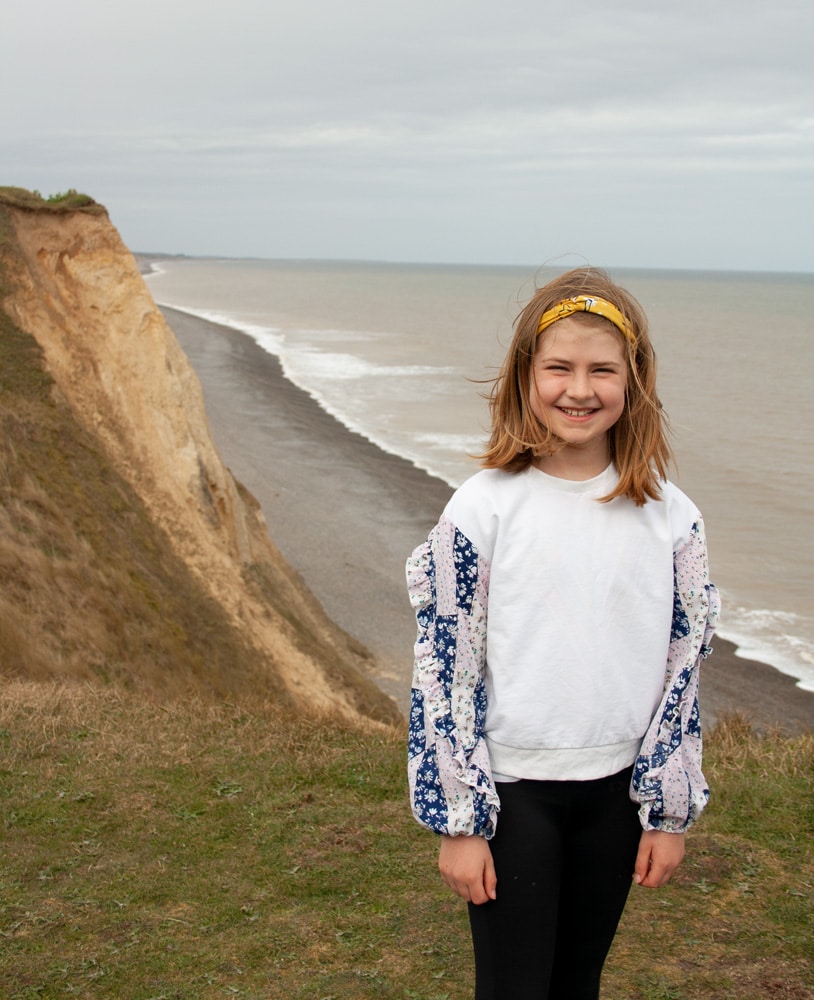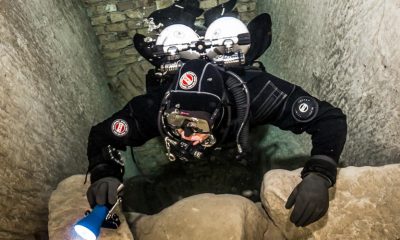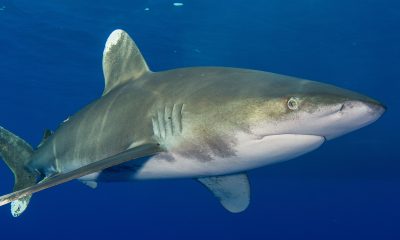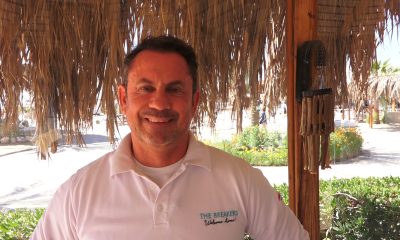Marine Life & Conservation
Meet Parpal Dumplin – Norfolk’s very own purple sea sponge named by local child

 Ten years ago, in 2011, a new sponge species was identified in the North Norfolk chalk beds by Seasearch volunteer divers. In January 2021, the Marine Conservation Society’s Agents of Change project invited children in the Norfolk area to name the purple sponge.
Ten years ago, in 2011, a new sponge species was identified in the North Norfolk chalk beds by Seasearch volunteer divers. In January 2021, the Marine Conservation Society’s Agents of Change project invited children in the Norfolk area to name the purple sponge.
Following lockdown, the judges thought that this would be an ideal time for school children to bond, while using their creativity – with no constraints. From home schooling children to entire classes, the panel of expert judges received a fantastic response with suggestions including Norfolk Purplish Plum and Purple Stone Sticker. All entries were carefully considered by a panel of experts, looking at the creativity, suitability and usability of each name.
It was unanimously agreed that the sponge should be named Parpal Dumplin. The winning name was suggested by nine-year-old Sylvie from Langham Village School, “because the sponge is purple and it looks like a dumpling”. The panel particularly liked that the spelling gives the sponge a strong connection to Norfolk.
The panel of experts deciding on the name included: Catherine Leigh, Education Adviser at Norfolk Coast Partnership, Annabel Hill, Senior Education Officer at Norfolk Wildlife Trust, Jenny Lumb, Teacher at The Coastal Federation, Nick Acheson, President at Norfolk and Norwich Naturalists Society and Claire Goodwin, Research Scientist at Huntsman Marine Science Centre and internationally renowned sponge specialist. At the meeting, the panel was supported by Seasearch East Coordinator, Dawn Watson, who recognised this sponge as special over a decade ago.
Claire Goodwin, internationally renowned sponge specialist, says: “Dawn and Rob invited me to join a Seasearch survey of the east coast, including the Cromer Shoal Chalk Beds. Dawn introduced me to a purple sponge she had noticed on the chalk reefs. We took samples, and believe it to be a species new to science, in a sub-genus of sponges known as Hymedesmia (Stylopus).”
“We need to look at specimens deposited in museums to understand how many different Hymedesmia (Stylopus) species exist in the UK and how they differ from this new species. The Agents of Change naming project has given the sponge a common name that we can use until it has a scientific one. I loved seeing all the creative suggestions.”
Sponges help to keep seawater clean by filter feeding, consuming tiny particles of food that float by. There are over 11,000 different species globally and our purple one is ‘encrusting’, meaning it adopts the shape of whatever it covers. It lives in Cromer Shoal Chalk Beds Marine Conservation Zone, a precious area of local seabed that needs to be taken care of.
Jenny Lumb, Teacher at The Coastal Federation, said: “Naming the purple sponge has been a fun way for children to find out about the fascinating life hidden beneath the waves. It’s amazing to be given the chance to name a species that scientists and divers will use for years to come! The children are so fortunate to have the MCZ on their doorstep. They had a great time on the beach discovering some of the life there, collecting litter and finding out about this special coastal area. I am sure the children will continue to enjoy and care for the coastal environment into the future.”
Catherine Leigh, Education Adviser from the Norfolk Coast Partnership said: “It was a pleasure to help decide on the sponge’s name from so many fantastic suggestions submitted and I hope it will inspire people to find out more about all the incredible inhabitants of this Marine Conservation Zone on our Norfolk coastline.”
Hilary Cox, Agents of Change Norfolk Coordinator, said: “Parpal Dumplin is a great choice by the decision panel of specialists: a local Norfolk name for this newly found species in North Norfolk’s Marine Conservation Zone.”
Annabel Hill, Senior Education and Engagement Officer at Norfolk Wildlife Trust said: “Wonderful to be involved in the process of naming a new species of sponge, found in Norfolk from a range of fantastic creative names suggested by local school children”.
You can find out more about the purple sponge, and the search for its name, by watching this animation: The seabed is a fun place to be! http://youtu.be/A_LUb8OSfn0
For more information on the work of the Marine Conservation Society visit their website by clicking here.
Marine Life & Conservation
Double Bubble for Basking Sharks

 The Shark Trust is excited to announce that, for two more days only, all donations, large or small, will be doubled in the Big Give Green Match Fund!
The Shark Trust is excited to announce that, for two more days only, all donations, large or small, will be doubled in the Big Give Green Match Fund!
Donate to Basking in Nature: Sighting Giants
The Shark Trust is hoping to raise £10k which will be doubled to £20k. This will go towards Basking in Nature: Sighting Giants. And they need YOUR help to reach they’re goal.
The Shark Trust’s citizen science project is to monitor and assess basking sharks through sightings; encouraging data collection, community engagement, and promoting nature accessibility. This initiative aims to enhance health and wellbeing by fostering a deeper connection with British Sharks.
Campaign Aims
- Increase citizen science reporting of Basking Sharks and other shark sightings to help inform shark and ray conservation.
- Provide educational talks about the diverse range of sharks and rays in British waters and accessible identification guides!
- Create engaging and fun information panels on how to ID the amazing sharks and rays we have on our doorstep! These can be used on coastal paths around the Southwest. With activities and information on how you can make a difference for sharks and rays!
- Promote mental wellbeing through increasing time in nature and discovering the wonders beneath the waves!
Donate, and double your impact. Click Here
Marine Life & Conservation
Leading UK-based shark conservation charity, the Shark Trust, is delighted to announce tour operator Diverse Travel as a Corporate Patron

 Corporate Patrons provide a valuable boost to the work of The Shark Trust. The Trust team works globally to safeguard the future of sharks, and their close cousins, the skates and rays, engaging with a global network of scientists, policymakers, conservation professionals, businesses and supporters to further shark conservation.
Corporate Patrons provide a valuable boost to the work of The Shark Trust. The Trust team works globally to safeguard the future of sharks, and their close cousins, the skates and rays, engaging with a global network of scientists, policymakers, conservation professionals, businesses and supporters to further shark conservation.
Specialist tour operator Diverse Travel has operated since 2014 and is committed to offering its guests high quality, sustainable scuba diving holidays worldwide. Working together with the Shark Trust will enable both organisations to widen engagement and encourage divers and snorkellers to actively get involved in shark conservation.
“Sharks are truly at the heart of every diver and at Diverse Travel, we absolutely share that passion. There is nothing like seeing a shark in the wild – it’s a moment that stays with you forever!” says Holly Bredin, Sales & Marketing Manager, Diverse Travel.
“We’re delighted to celebrate our 10th year of business by becoming a Corporate Patron of the Shark Trust. This is an exciting partnership for Diverse and our guests. We will be donating on behalf of every person who books a holiday with us to contribute towards their vital shark conservation initiatives around the world. We will also be working together with the Trust to inspire divers, snorkellers and other travellers to take an active role – at home and abroad – in citizen science projects and other activities.”
Paul Cox, CEO of The Shark Trust, said:
“It’s an exciting partnership and we’re thrilled to be working with Diverse Travel to enable more divers and travellers to get involved with sharks and shark conservation. Sharks face considerable conservation challenges but, through collaboration and collective action, we can secure a brighter future for sharks and their ocean home. This new partnership takes us one more valuable step towards that goal.”
For more information about the Shark Trust visit their website here.
For more about Diverse Travel click here.
-

 News3 months ago
News3 months agoHone your underwater photography skills with Alphamarine Photography at Red Sea Diving Safari in March
-

 News3 months ago
News3 months agoCapturing Critters in Lembeh Underwater Photography Workshop 2024: Event Roundup
-

 Marine Life & Conservation Blogs2 months ago
Marine Life & Conservation Blogs2 months agoCreature Feature: Swell Sharks
-

 Blogs2 months ago
Blogs2 months agoMurex Resorts: Passport to Paradise!
-

 Blogs2 months ago
Blogs2 months agoDiver Discovering Whale Skeletons Beneath Ice Judged World’s Best Underwater Photograph
-

 Gear Reviews3 months ago
Gear Reviews3 months agoGear Review: Oceanic+ Dive Housing for iPhone
-

 Marine Life & Conservation2 months ago
Marine Life & Conservation2 months agoSave the Manatee Club launches brand new webcams at Silver Springs State Park, Florida
-

 News3 months ago
News3 months agoWorld’s Best Underwater Photographers Unveil Breathtaking Images at World Shootout 2023



















